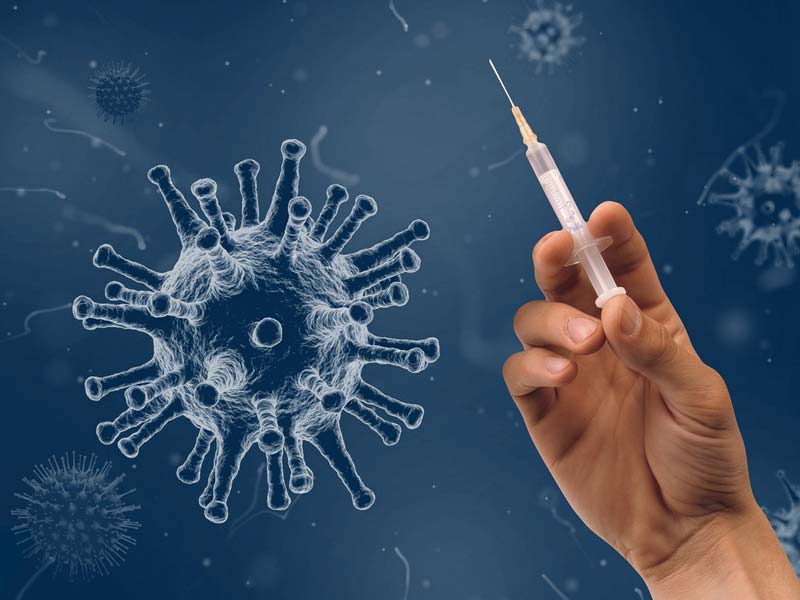
Ever since the Omicron COVID variant was detected, there has been a growing concern over the efficacy of the various COVID-19 vaccines that are currently in use throughout the world. As per preliminary findings, the newest ‘variant of concern’ can evade protection afforded by the COVID vaccines. As of now, this has been shown in vaccines developed by the US pharmaceuticals giants Pfizer and Moderna and by the British-Swedish firm AstraZeneca. However, a glimmer of hope amid all this gloom is that COVID booster shots have proved to be effective against this highly transmissible strain. However, the data from the United Kingdom now shows that the protection afforded by the booster shots wanes within 10 months after receiving the third dose.
Table of Content:-
UK Study On Efficacy Of Booster Doses Against Omicron

(Photo Credit: Pixabay)
The latest data by the UK Health Security Agency suggests that the effectiveness of the booster doses of different COVID vaccines wanes within 10 weeks after administering the third dose. The vaccines that were studied were those developed by AstraZeneca, Pfizer-BioNTech, and Moderna. In total, as many as 148,000 cases of the Delta variant and 68,000 Omicron cases were analysed.
- First come those who received the first two shots of the AstraZeneca vaccine. This was followed by a third dose of mRNA vaccine, which was either the one developed by Pfizer or Moderna. In such a case, the booster was 60% effective against symptomatic Omicron infection within two to four weeks after getting the third shot. In this case, the Pfizer booster was 35% effective in warding off symptomatic Omicron. Moderna’s jab did slightly better by being 45% effective in preventing Omicron infection.
- Among those who received three doses of Pfizer’s vaccine, the efficacy was 70% a week after getting the booster. This dropped to a mere 45% ten weeks after getting the third dose.
- The regimen of two Pfizer shots followed by Moderna’s booster seemed to do much better. Its efficacy against Omicron stayed at 75% about nine weeks after getting boosted.
- Another thing about Omicron that the analysis highlighted was that the variant, as of now, appears to cause less severe infection and hospitalisation as compared to the highly virulent Delta variant.
The UK Health Security Agency has, however, noted that the data should be read cautiously. This is because not many infections with Omicron have been reported and the cases that have been analysed shouldn’t be interpreted for the entire population.
Also read: Covid-19: Experts Warn Against Trendy Cloth Masks, Of No Use With Omicron Variant
COVID Booster Shots: A Lesson For India

(Photo Credit: Pixabay)
The analysis can be taken as a lesson for India, which has recently announced booster doses to be administered to a certain section of the population. The aforementioned analysis can be crucial for the country as it studied the AstraZeneca jab, which is being marketed as Covishield in India and is the primary vaccine being administered in the country.
In an address to the nation on Saturday, Prime Minister Narendra Modi announced that:
- Healthcare and frontline workers will receive booster shots from January 10 onwards.
- Those over the age of 60 and with co-morbidities can also get boosted as per their doctor’s advice.
- The government has also opened the vaccination drive for children. Those falling in the age group 15 to 18 can get vaccinated from January 3 onwards.
This came as the Omicron variant is spreading fast in the country. India has logged 578 such cases as of Monday. This came following a record 156 cases jump recorded on Sunday. The highly transmissible variant has spread to about 19 states and union territories (UTs). Among them, Delhi tops the list with 142 cases, followed by Maharashtra with 141 cases, Kerala (57 cases), and Gujarat (49 cases).
Also read: Lower Risk Of Hospitalisation With Omicron VS Delta? South Africa Experience
Due to the rapid spread of the Omicron variant, multiple states have announced restrictions. The national capital had placed a ban on gatherings on Christmas and New Year. States such as Uttar Pradesh, Karnataka, Madhya Pradesh, Haryana, and Delhi have also announced night curfews. If we talk about the total COVID count, then India has till now reported over 34.7 million virus cases along with 479,997 deaths. This came after the country recorded 6,531 new COVID cases and 315 fatalities on Monday.
Photo Credit: Pixabay
Also watch this video
How we keep this article up to date:
We work with experts and keep a close eye on the latest in health and wellness. Whenever there is a new research or helpful information, we update our articles with accurate and useful advice.
Current Version